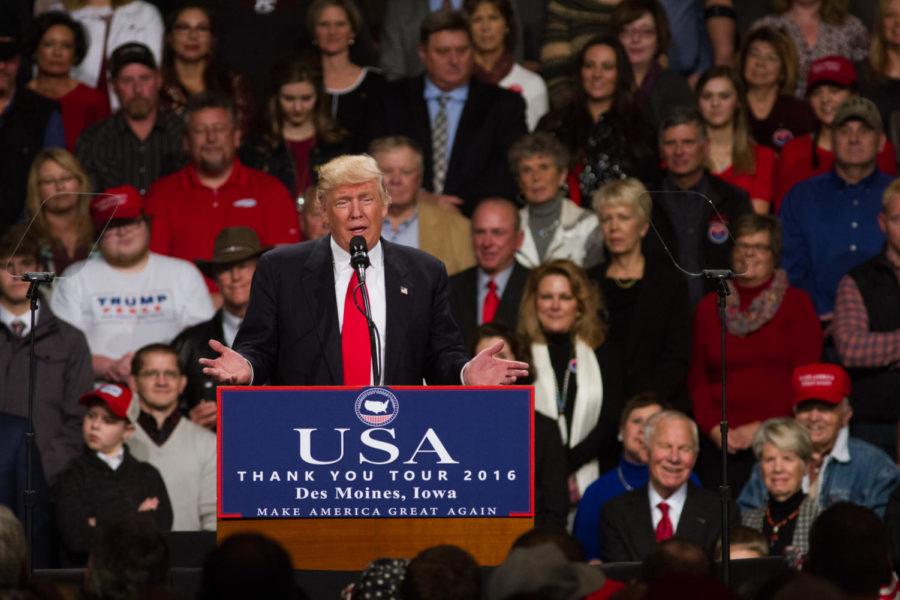Kelly: ‘America First’ mentality is too vague, too shallow
President Elect Donald Trump speaks during a rally as part of his USA Thank You Tour, in Des Moines during the evening of Dec. 8. Trump spoke about the general election, how he would repeal Obamacare, bring jobs back to the US, and reform care for veterans.
February 23, 2017
In an interview with the Washington Post earlier this year, President Trump, when asked about the origins of his campaign slogan, “Make America Great Again,” told a reporter, “… I had started off, ‘We Will Make America Great.’ That was my first idea. … And then all of a sudden it was going to be ‘Make America Great.’ But that didn’t work because that was a slight to America because that means it was never great before. And it has been great before.”
Surprisingly, Trump has not been asked to elaborate on why America was — or, as many believe, still is — great.
Consequently, one can only conjecture Trump’s beliefs regarding this matter. His “America First” mentality does not appear to be one rooted in principle. Rather, it is more closely aligned with simplistic, “blood-and-soil” nationalism. In other words, we are America, therefore we are great.
Basic pride in one’s country is not innately flawed, but it is shallow and can tend toward tribalism. The truth is that America is great because of its founding principles and ideals: God-given natural rights, individual liberty, limited government and the belief that authoritative bodies derive their power from citizens, just to name a few.
The conservative definition of nationalism contends that America has prospered not because it has had many great successes, but because its ideals and fundamental principles are noble and worthy of aspiration, and the pursuit of those beliefs has fostered a civilization that breeds success by way of its guaranteed freedoms and its rule of law.
This is not to deny that America has fallen far short of its own ideals many times in the past. But it is to suggest that maintaining these principles as a moral compass has kept America on the “right track” — namely, one that prioritizes the liberties of individual citizens who are endowed with natural rights, whether or not those rights are continually protected in practice. As a nation, our constant endeavor to realize our sublime Constitutional ideals has, generally, allowed us to maintain high moral standards and ensured the preservation of our rights.
If Trump truly subscribed to this notion, rather than one that resembles blood-and-soil nationalism, one would not have expected him to remark that businesses should “buy American and hire American,” or to continuously threaten American businesses, should they decide to outsource jobs.
To be fair, if Trump had alluded, in any capacity — whether within comments made, or policy proposals put forth, during either of his campaigns — to a belief that such comments or policy proposals were at least somewhat rooted in the belief that America’s exceptionalism is predicated on the values and principles it espouses, he likely would not have been accused of promoting the idea that America’s material wealth and statistical “success” supersedes that of any other nation.
For the sake of simplicity — in terms of creating binary opposition regarding terminology — one could look to patriotism as a refined projection of nationalism. However, although both concepts must necessarily be channeled in constructive directions, and not used as justification for amoral or illiberal acts, their distinction is far from negligible. On a basic level, nationalism solely emphasizes love of one’s country. Patriotism, on the other hand, promotes a love of one’s country founded in its core principles and beliefs. This is not to say that one cannot champion both notions in a sort of progression. Rather, it is to say nationalism varies significantly from patriotism in one crucial manner: It generally casts aside principle in favor of emotion.
All available evidence suggests Donald Trump believes Americans should find solidarity in their common heritage. This belief is not inherently dangerous; it is not wrong for one to be proud of being American. But greater bonds of unity can be achieved when citizens see themselves as members of a nation that strives to uphold the rights of its citizens, and believes that those rights are unassailable.
In other words, being proud of what America has accomplished is one thing. But understanding what America stands for inspires a deeper, more precise pride that is not overly-zealous or vain. A social fabric woven around a core of fundamental principles, as well as a knowledgeable appreciation for those ideals, is far less likely to tear than one whose composition rests solely on a vague feeling of superiority.







